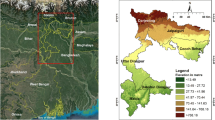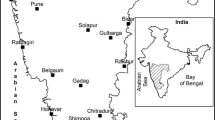Abstract
Karachi is the largest city of Pakistan. The temperature change in Karachi is studied in this research by analyzing the time series data of mean maximum temperature (MMxT), mean minimum temperature (MMiT) and mean annual temperature (MAT) from 1947 to 2005 (59 years). Data is analyzed in three parts by running linear regression and by taking anomalies of all time periods: (a) whole period from 1947–2005; (b) phase one 1947–1975 and (c) phase two 1976–2005. During 1947 to 2005 MMxT has increased about 4.6°C, MMiT has no change and MAT has increased 2.25°C. During 1947–1975, MMxT increased 1.9°C, in this period there is − 1.3°C decrease in MMiT and MAT has raised upto 0.3°C. During 1976–2005, the MMxT, MMiT and MAT increased 2.7°C, 1.2°C and 1.95°C, respectively. The analysis shows significantly the role of extreme vulnerability of MMxT in rising the temperature of Karachi than the MMiT.
Similar content being viewed by others
References
Alam M, Golam Rabbani MD (2007) Vulnerabilities and responses to climate change for Dhaka. Environ Urban 19(1):81–97
Asian Urban Information Centre of Kobe (AUICK) (2006) Workshop on population and sustainable development addressed by United Nation Fund for Population Activities (UNFPA), June 19–29, 2006, Kobe, Japan
Chung Y-S, Yoon M-B, Kim H-S (2004) On climate variations and changes observed in South Korea. Clim Change 66:151–161
City District Government Karachi (CDGK) Pakistan (2008) Karachi city geography and demography. http://www.karachicity.gov.pk/ URL accessed on November 22, 2008 at 10:27
Economic Survey of Pakistan (2006) Population, labour force & employment, Pakistan Federal Bureau of Statistics, part 13, pp 187–199
Edmilson FD, Rozoff Christopher M, Cotton William R, Silva Dias Pedro L (2007) Interactions of an urban heat island and sea-breeze circulations during winter over the metropolitan area of São Paulo, Brazil. Boundary-Layer Meteorol 122(1):43–65
Energy Information Administration (EAI) (2008) Official energy statistics from the US Government. http://tonto.eia.doe.gov/country/country_energy_data.cfm?fips=PK. URL accessed on November 23, 2008 at 23:47
Federation of Pakistan Chambers of Commerce & Industry (FPCCI) (2008) Industrial zones in Pakistan. http://www.fpcci.com.pk/industrialzone.asp. URL accessed on November 20, 2008 at 21:18
Gupta A (2004) Geoindicators for tropical urbanization. Environ Geol 42:736–742
Liu W, Ji C, Zhong J, Jiang X, Zheng Z (2007) Temporal characteristics of the Beijing urban heat island. Theor Appl Climatol 87:213–221
Mills G (2006) Progress toward sustainable settlements: a role for urban climatology. Theor Appl Climatol 84:69–76
Qureshi IA, Lu H (2007) Urban transport and sustainable transportation strategies: a case study of Karachi, Pakistan. Tsinghua Sci Technol 12:309–317
Qureshi IA, Lu H, Ye S (2008) Urban transportation and equity: a case study of Beijing and Karachi. Trans Res Part A 42:125–139
Salinger MJ (2005) Guest editorial, increasing climate variability and change: reducing the vulnerability. Clim Change 70:1–3
Tickell C (1990) Human effects of climate change: excerpts from a lecture given to the society on 26 March 1990. Geogr J 156:325–329
University College London Workshop (2005) Climate change and urban areas: 11–12 April 2005. University College London Environment Institute Report, pp 1–28
World Meteorological Organization (WMO) (2004) Press release no. 718. Geneva. www.wmo.ch/web/Press/Press718_E.doc. Accessed on November 15, 2008, at 14:53
Yin D, Zhiqing X, Yan Z, Yafeng S, Jingang W (2007) Impact of urban expansion on regional temperature change in the Yangtze River Delta. J Geogr Sci 17(4):387–398
Author information
Authors and Affiliations
Corresponding author
Rights and permissions
About this article
Cite this article
Sajjad, S.H., Hussain, B., Ahmed Khan, M. et al. On rising temperature trends of Karachi in Pakistan. Climatic Change 96, 539–547 (2009). https://doi.org/10.1007/s10584-009-9598-y
Received:
Accepted:
Published:
Issue Date:
DOI: https://doi.org/10.1007/s10584-009-9598-y




